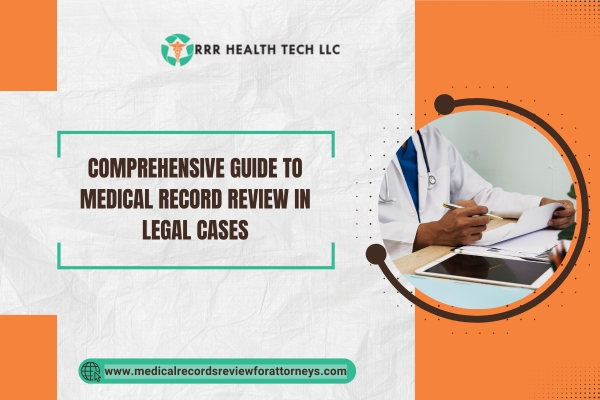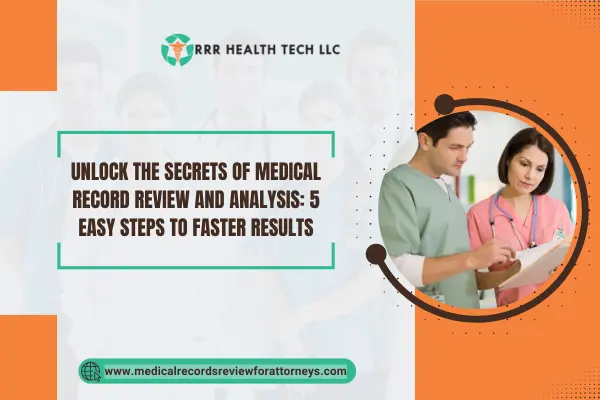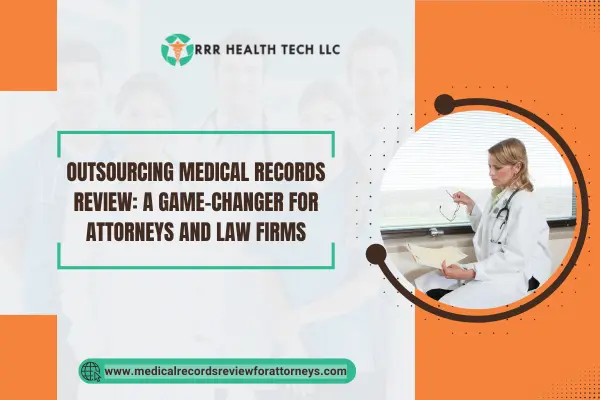
The examination of medical records and recounting of events is as important as footages all over the world. This article is designed specifically for personal injury and medical negligence cases that will help lawyers understand the nuances of medical record review, its relevance, difficulties, and how experts can assist in crafting better legal documents and pleadings.
Understanding Medical Record Review
What is Medical Record Review?
As a part of the legal processes, medical record review involves the collection and analysis of medical data provided by the patient. This important step is necessary to determine whether the claims made are valid and merit attention.
Importance of Medical Record Review in Legal Cases
• Establishing Facts: Medical records bear crucial information that should be taken into account in a court proceeding since these records contain verifiable information related to the case.
• Supporting Claims: The findings of such reviews may exonerate or convict the parties in a dispute because they may help prove the claims of the litigants.
• Clarifying Complex Information: The language and the information presented in the medical records may be difficult to understand without the appropriate context.
The Process of Medical Record Review
Steps Involved in Medical Record Review
- Record Register: Collecting medical files from relevant practitioners or health facilities.
- Arrangement: Arranging the records in a timeline to habilitate the interpretation of the course of events medically.
- Evaluation: Gathering the major medical events, modalities, and consequences based on scrutinized analysis.
- Report Composition: Formulating the findings in a report which is informative but contains essential details.
- Professional Expert elucidation: Employing medical professionals to read complex medical documents.
Role of Medical Professionals in Record Review
Medical experts are in the forefront of the review. Their knowledge and understanding of medical terminologies and procedures assure accuracy in interpretation. They will help determine the quality of care rendered and detect any lapses in the minimum standard of care.
Legal Aspects of Medical Record Review
Compliance and confidentiality
• The laws and regulations governing healthcare: A review of the medical records must comply with the laws of the country and the region’s healthcare services. This will make certain that all things done are within the law.
• Patient confidentiality: It is essential that the sensitive information of the patient is protected during the review.
Objectivity in Reviews
Undoubtedly, objective evaluations form the basis of any credible evidence and thus should be conducted in a fair manner. Such a view is critical in presenting medical facts in a legal framework.
Challenges in Medical Record Review
Common Challenges Faced
- Missing Dealings: Missing records or incomplete records can severely obstruct the review processes as well as the quality of the findings.
- Medical Vocabulary: Unfamiliar medical terms can make the subject matter difficult to comprehend for the people who are not from the medical field.
- Data Quantity: Massive amounts of records can be difficult to review hence there is a need for quick effective management processes.
The Role of Medical Record Review Companies
Why Choose Professional Services?
Professional medical record review companies offer several advantages:
- Expertise: Trained professionals can accurately interpret and summarize medical records, ensuring that all relevant information is captured.
- Time Efficiency: Outsourcing the review process allows attorneys to focus on case strategy rather than document preparation.
- Quality Assurance: Experienced reviewers ensure that summaries are comprehensive and meet legal standards.
Future Trends in Medical Record Review
Technical Advancements
Artificial intelligence (AI) is already changing the sphere of clinical record assessment and it will completely transform the scope of its review in the future. Innovations such as AI and parts of digitalization are already making assessment more accurate and efficient. The review of medical records will continue to improve as more and more records are kept digital.
The Growth of Telemedicine
Telemedicine has also altered the face of medical record evolution. Such changes will most likely bring about a different methodology of record reviewing. An increase in consultative meetings along with an increase in digital documentation will now be the norm in medical practices.
Case Studies
Case Study 1: Medical Malpractice
Overview of the Case: A patient went through surgery and developed some complications that were turned into a malpractice case against the surgeon.
Challenges:
• The medical records were bulky as they involved many other practitioners
• The inconsistencies of the documentation raised issues concerning the standard of care.
Solutions:
• A holistic review was done with regard to the events that happened versus the standard of care that was supposed to be received.
• There was a clear engagement of medical experts in the interpretation of the results and opinion given.
Compensation: The findings of the systematic review substantiated effective discrepancies which led to successful settlement by the plaintiff.
Case Study 2: Personal Injury Claim
Overview of Case: A plaintiff sustained injuries from a car accident and thereafter filed a personal injury claim against the negligent motorist in question.
Challenges:
• There were too many medical files from different hospitals and clinics waiting to be analyzed.
• The challenge is to prove a causal relationship between the claimed personal injuries and the given accident.
Solutions:
• The records were filed in a chronological order to show treatment advices and outcomes.
• An abstract was written which established a relationship between the car accident and the subsequent medical treatment.
Compensation: Because the medical proof was well presented, the client’s case was strengthened beyond measure and a positive settlement was reached.
Conclusion
Multifaceted medical documentation analysis is one of the most crucial activities in personal injury and medical malpractice legal cases. This understanding of the work, together with an appreciation of expert rendering of medical evidence, enables attorneys to strategically plan his or her work and ultimately achieve better results for the clients. The emerging nature of technology makes it essential for legal professionals to remain up to date with the best practices as well as the new features to aid medical file analysis.


